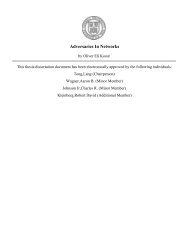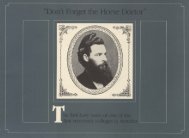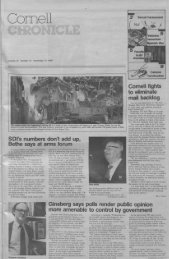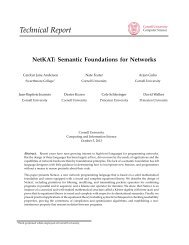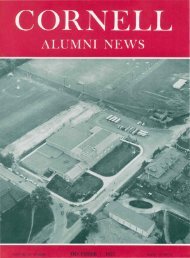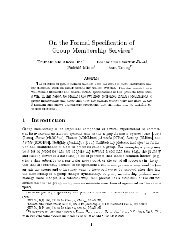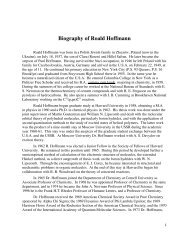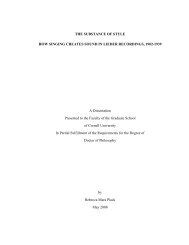Cornell Alumni News - eCommons@Cornell - Cornell University
Cornell Alumni News - eCommons@Cornell - Cornell University
Cornell Alumni News - eCommons@Cornell - Cornell University
Create successful ePaper yourself
Turn your PDF publications into a flip-book with our unique Google optimized e-Paper software.
I<br />
" 1U<br />
A daughter snaps Gold on a garden tightrope . . .<br />
and climbing a 15-foot pole.<br />
few apply quite the determination that<br />
does Professor Thomas Gold, 46, director<br />
of the Center for Radiophysics &<br />
Space Research and chairman of the department<br />
of astronomy.<br />
Gold has hitched his academic star to<br />
the "steady state" theory of the creation<br />
of the universe, and his personal star to<br />
a steady program of exercise that even<br />
includes tightrope walking. He has been<br />
a member of the faculty since 1959, before<br />
and since which time he has<br />
achieved international fame for his outspoken<br />
advocacy of the steady state point<br />
of view.<br />
His neighbors in Cayuga Heights are<br />
accustomed to seeing him moving deftly<br />
across a tightwire or climbing nimbly up<br />
a fifteen-foot pole he has set up in his<br />
garden. "Tightrope walking is especially<br />
good for you," Gold comments. "It gives<br />
you balance."<br />
One Thanksgiving Day he startled<br />
passersby when he chipped away the ice<br />
from his seventeen-foot boat and went<br />
water-skiing on the frigid waters of Cayuga<br />
Lake. At 7 another frosty November<br />
morning eyebrows were lifted in a<br />
hotel lobby when Gold and visiting Australian<br />
astronomer Harry Messel sauntered<br />
out in bathing trunks and raincoats<br />
to go water-skiing. "I cannot fathom<br />
what the hotel people thought," the <strong>Cornell</strong><br />
scientist said in recounting the incident.<br />
Gold is so devoted to exercise that he<br />
often runs from one building on the<br />
campus to another. He also shuns elevators<br />
and bounds up the stairs of classroom<br />
and research buildings two at a<br />
time, sometimes alarming slower moving<br />
students or colleagues.<br />
"You might as well get in some exercise,"<br />
he says. "The average person gets<br />
little enough as it is."<br />
Leaning back in a chair with hands<br />
clasped behind his head, Gold looks<br />
more like a graduate student than a cosmologist<br />
whose views about the origin<br />
and nature of the universe have had a<br />
profound effect on contemporary astronomical<br />
thought.<br />
"I've always liked athletic things," he<br />
said. "As a boy I thought I'd like to become<br />
a ski professional." Instead he went<br />
to Cambridge <strong>University</strong> for more than<br />
ten years where as an undergraduate he<br />
was a long distance runner, pole vaulter,<br />
and high jumper. He came to <strong>Cornell</strong> in<br />
1959 after two years as a professor of<br />
astronomy at Harvard <strong>University</strong>.<br />
"I think this is a great area," Gold<br />
says of Ithaca and the surrounding Finger<br />
Lakes Region. "It's not many places<br />
where you can be teaching in a classroom<br />
or be conducting an experiment and then<br />
be water skiing on a big lake in fifteen<br />
minutes or snow skiing in half an hour."<br />
His enthusiasm for skiing isn't confined<br />
to Cayuga's waters. He's also an expert<br />
snow skier and has participated in<br />
races on the slopes of Switzerland. He's<br />
also a familiar figure at Greek Peak, a<br />
ski area near Ithaca, as well as at centers<br />
in Vermont, Switzerland, and South<br />
America.<br />
What does a world-famous astronomer<br />
think about as he's skimming along a<br />
lake or streaking down a ski slope? "It's<br />
too demanding to think about anything<br />
else," he remarks. "One must keep his<br />
wits about him or he'll wish he had."<br />
Gold's Minnesota-born wife Merle and<br />
their three blonde daughters, Linda 17,<br />
Lucy 12, and Tanya 6, all share his love<br />
for exercise—especially skiing.<br />
The Austrian-born Gold drew international<br />
attention in 1948 when with<br />
Herman Bondi of the <strong>University</strong> of London<br />
and Fred Hoyle of Cambridge <strong>University</strong><br />
he originated the theory of the<br />
continuous creation of matter, known, as<br />
the "steady state" theory. This theory<br />
holds that the universe has no beginning<br />
and no end and that matter is constantly<br />
being created, the new galaxies and star<br />
clusters formed within an expanding universe.<br />
This theory opposed that held by<br />
many other scientists that the universe<br />
had its origin as a result of a tremendous<br />
explosion between five and ten billion<br />
years ago. The latter theory is known as<br />
the "big bang" theory [NEWS, May 15,<br />
1961].<br />
Gold has also come to be known for<br />
his advocacy of a theory that many areas<br />
of the moon are covered with a soil made<br />
of finely pulverized rock.<br />
He says his vigorous physical activities<br />
are based on his conviction that a sound<br />
mind should be paired with a sound<br />
body. Gold's trim, muscular five-foot<br />
eight body is apparent proof his physical<br />
culture theory is working.<br />
May 1967 27




